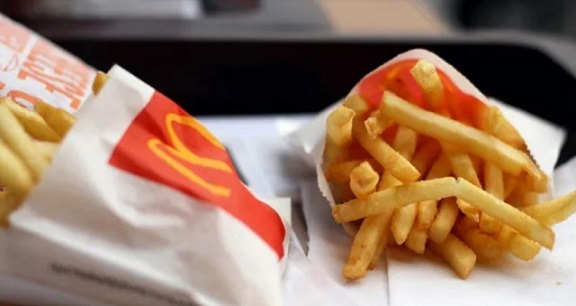
Sneaky bastards!
From Eat This, Not That, July 18, 2021:
[McDonald’s] fries are made of more than just Russet Burbank and Shepody potatoes—they also pack in vegetable oil (canola oil, corn oil, soybean oil, hydrogenated soybean oil, natural beef flavor), dextrose, sodium acid pyrophosphate, and salt. And the culprit that’s responsible for cultivating your addiction is the far-from-innocent natural beef flavor. McDonald’s discloses that this savory addition is mostly made up of hydrolyzed wheat and hydrolyzed milk.
While wheat and milk aren’t bad ingredients (unless you have an intolerance), hydrolyzing them—in a process where heat and chemicals break down the foods and produce MSG, which achieves extra appetizing flavors—poses a threat to your tummy. Besides for weight gain and weird allergy-type reactions, MSG also increases appetite by inhibiting your brain from registering that you’re satiated. In fact, one study found that giving laboratory rats MSG increased their food intake by an extra 40 percent!
From WebMD, Feb. 19, 2019:
Monosodium glutamate (MSG) . . . is a seasoning made from sodium and glutamate, an amino acid that’s found naturally in certain foods like tomatoes, soy sauce, and aged cheeses. Glutamate was discovered as a flavor enhancer in 1908 by a Japanese professor. . . . Glutamate is unique because it hits the fabled “fifth taste” called umami (Japanese for “delicious”), a decidedly savory and meaty flavor. The professor filed for a patent to produce MSG, and it became widely used to season food. . . .
[I]n the 1990s, the FDA asked an independent scientific group to investigate. The group concluded that MSG is safe, though they said some sensitive people might get short-term symptoms (like headache or drowsiness) if they consume 3 grams or more of MSG (a typical serving in food is less than .5 grams). The FDA classifies MSG as “generally recognized as safe”, the same designation that ingredients like sugar and baking soda have. They say the body metabolizes MSG the same way it does the natural glutamate found in food. Also of note: The International Headache Society no longer includes MSG on their list of headache triggers.
~E

I’ve quit McDoodles not because of their food,which I generally enjoy,but because of their re-fab system with more automation. It costs me more,but I eat at sit-down restaurants,because there I can deal with PEOPLE,not machines.
Same here…we rarely do fast food any more. It’s either sit down restaurants or to go orders. Mexican, Korean, etc. Plus I can make a better/cheaper burger at home!
I used to drive through to get the French Fries twenty years ago. Now I go to small business owner restaurants. No more big gov chains if I can keep from it.
Although. some may say MSG isn’t hazardous to our health–it also is not found anywhere in nature. There were times when I would eat Chinese food that had been doctored with it–only to wake up in the morning with my face swollen and my eyes half shut due to ingesting it. I try to stay as far away from it as possible. Not that I very often eat McDonald’s french fries–now I will make a concerted effort to never eat them. French fries don’t need MSG on them . . . . . Period!!!!!
From your description, you must be allergic to MSG, as are many people. It has no nutritional value, and is addictive, causing people to overeat, so why ingest any food with MSG?
I agree. I can’t eat commercial McDonald’s fries or much Asian fare b/c of the MSG. It tastes good going down, but I “pay” for it in feeling bad for days, so I just avoid it all. I can prepare the like at home and NOT suffer, so I know it’s the commercial use of ingredients that I would never use at home in the same dish preps.
McD’s fries’ seasoning is salt and beef tallow.